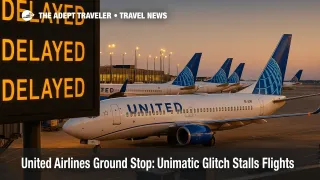United Airlines ground stop: Unimatic glitch stalls flights

United Airlines froze all mainline departures across the United States for nearly four hours on August 6 after its decades-old Unimatic weight-and-balance system crashed, forcing the Federal Aviation Administration to issue a nationwide ground stop. Operations restarted just before 10 p.m. Eastern, but the outage left more than one-third of the carrier's schedule in disarray, stretching recovery efforts into Thursday morning. United characterized the failure as a controllable delay and promised accommodation for stranded travelers.
Key Points
- Why it matters: A single-system failure halted the world's fourth-largest airline.
- Travel impact: 1,038 delays and more than 200 cancellations rippled across five hubs.
- What's next: United is repositioning crews and aircraft, targeting full recovery within 24 hours.
Snapshot
The glitch hit at 612 p.m. ET, when Unimatic stopped feeding weight, balance, and flight-time data to downstream programs. Within minutes United asked the FAA to hold all mainline departures at Denver, Houston, Newark, Chicago, and San Francisco. Flights already airborne continued, but many had to wait for gates, choking ramp space and slowing connections. By 1025 p.m. ET FlightAware logged 1,038 delays-about 34 percent of United's schedule-and more than 200 cancellations before midnight. Although the underlying issue was fixed before 10 p.m., schedule knock-on persisted into the early-morning bank on August 7.
Background
Unimatic dates to the 1970s and is deeply embedded in United's dispatch workflow, calculating aircraft weight-and-balance data and posting flight movement messages. When the system stalled, United lost the ability to certify safe take-off loads, a direct regulatory requirement. Similar IT breakdowns have plagued other carriers-Alaska Airlines grounded its fleet in July and Delta required five days to recover from a July 2024 outage-raising industry concern over legacy software resilience. Transportation Secretary Sean Duffy emphasized that Wednesday's disruption was isolated to United and unrelated to national air-traffic-control infrastructure. The FAA provided technical support but left ground-stop decisions to the airline.
Latest Developments
System fix and flight recovery
United engineers rebooted Unimatic's core servers and validated data integrity by 945 p.m. CT, allowing dispatchers to release queued flights. Priority went to trans-Pacific departures facing curfews, followed by hub-to-hub shuttles needed to reposition aircraft. United said it would reimburse overnight lodging and meals for travelers affected by controllable delays. Early-morning August 7 operations showed markedly lower disruption by 7 a.m. ET FlightAware tracked 137 residual delays and 18 cancellations. Analysts expect a near-normal afternoon push, weather permitting.
Analysis
The Aug. 6 glitch underscores how a single-point legacy system can jeopardize a network handling 5,000 daily flights. While United has invested billions in customer-facing upgrades, Unimatic remains the beating heart of its operations, in part because rewriting weight-and-balance logic demands rigorous FAA recertification. The outage also highlights the regulatory balance between airline autonomy and federal oversight: the FAA can impose a command ground stop, yet here merely echoed United's request. Competitors watching the fallout will likely accelerate their own modernization timetables, fearing a similar meltdown during the peak holiday period. For travelers, the episode reinforces the utility of same-day backup itineraries and real-time flight-tracking apps. For United, the immediate cost is modest-crews and equipment were in position-but the reputational hit arrives at a delicate moment as the carrier rolls out new premium-cabin products. Investors shrugged off the shock, but brand trust is harder to reclaim.
Final Thoughts
United's swift return to service limits the long-term fallout, yet the event is a stark reminder that 21st-century aviation still hinges on 20th-century code. Until Unimatic is fully replaced, any similar hiccup could again trigger a United Airlines ground stop.
Sources
- United Airlines flights resume after it resolves technology glitch, Reuters
- United Airlines says issue that forced grounding of hundreds of US flights resolved, The Guardian
- Ground stop issued for United Airlines mainline flights across US, 6ABC Philadelphia
- United Airlines Tech Issue Grounds Hundreds of Flights. The Stock Shrugs., Barron's
- United Airlines Grounds Flights Across the U.S. Over 'Technology Disruption', People
- Over 1,000 United Airlines flights delayed overnight after glitch sparks travel chaos, New York Post
